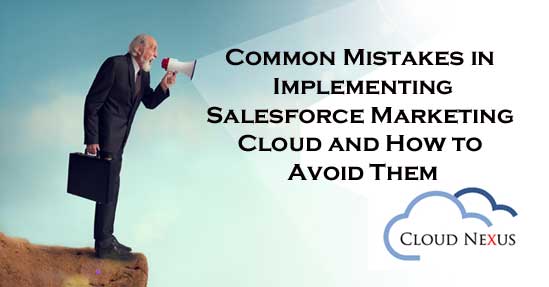Salesforce Marketing Cloud (SFMC) is a powerful platform that can significantly enhance your marketing capabilities. However, many companies struggle to maximize its potential due to common pitfalls during implementation. Whether you’re new to Marketing Cloud or have been using it for a while, it’s important to recognize these mistakes and implement best practices to ensure you’re getting the most out of your investment.
Lack of a Clear Strategy
One of the biggest mistakes companies make is diving into Salesforce Marketing Cloud without a well-defined marketing strategy. SFMC offers a wide range of tools—Email Studio, Journey Builder, Mobile Studio, and more—but without a plan, it’s easy to misuse or underutilize these features.
How to Avoid It
- Start with a clear understanding of your marketing goals.
- Align your SFMC tools with your objectives. For example, if customer engagement is a priority, focus on Journey Builder for personalized experiences.
- Map out your customer journeys before you start using the platform.
Improper Data Management
Data is the backbone of any marketing strategy, and poor data management is a frequent issue in SFMC implementations. Whether it’s incomplete data, inconsistent formatting, or failure to integrate data from different sources, these problems can cripple your marketing efforts.
How to Avoid It
- Perform a data audit before implementation to ensure you have clean, structured, and unified data.
- Regularly update and clean your data to avoid sending outdated or irrelevant content to your customers.
- Integrate SFMC with other Salesforce products like Sales Cloud or external CRMs for a unified customer view.
Not Fully Utilizing Automation Features
Salesforce Marketing Cloud provides several automation tools, but many users fail to take full advantage of them. Whether it’s automating repetitive tasks, personalizing communications, or using AI for predictive insights, missing out on automation means missing out on the true power of the platform.
How to Avoid It
- Leverage Automation Studio to streamline workflows, such as scheduling email sends or data imports.
- Use Journey Builder to automate customer journeys, allowing you to engage customers based on their behavior.
- Experiment with SFMC’s AI-driven features like Einstein to optimize campaigns and predict customer behavior.
Poor Integration with Other Tools
Marketing Cloud can do wonders on its own, but its real value shines when integrated with other systems like Sales Cloud, Service Cloud, or even third-party platforms like Google Analytics or social media management tools. Unfortunately, many users fail to integrate Marketing Cloud effectively, leading to disjointed data and marketing efforts.
How to Avoid It
- Plan for seamless integration during your SFMC implementation. Identify the tools your marketing and sales teams are using and connect them to create a unified marketing ecosystem.
- Work with Salesforce developers or consultants to ensure proper API configurations and data flows.
Not Testing Campaigns
A common but avoidable mistake is neglecting to test campaigns before they go live. Whether it’s an email campaign with broken links or a personalized message that doesn’t render correctly, these mistakes can damage your brand’s reputation.
How to Avoid It
- Use SFMC’s built-in A/B testing features to test different versions of your campaigns before launching.
- Always preview emails and other assets in multiple formats and devices to ensure compatibility.
- Implement a quality assurance process that includes review from various stakeholders.
Overlooking Compliance and Security
With the increasing focus on data privacy regulations (GDPR, CCPA, etc.), companies need to ensure they are compliant with global and local data privacy laws when using Salesforce Marketing Cloud. Failing to configure data privacy settings correctly can result in hefty fines or reputational damage.
How to Avoid It
- Set up preference centers and subscription management options to allow customers control over the communications they receive.
- Regularly review your data handling and storage practices to ensure they are compliant with the latest regulations.
- Use SFMC’s encryption and security settings to protect customer data.
Focusing Too Much on Email and Ignoring Other Channels
Many marketers focus solely on email marketing, neglecting the other powerful tools in SFMC like Mobile Studio, Advertising Studio, and Social Studio. While email marketing is important, an omnichannel approach can significantly increase engagement and conversion.
How to Avoid It
- Experiment with SFMC’s various tools to reach customers on multiple channels.
- Create an integrated strategy that includes SMS, social media, and advertising alongside email campaigns.
- Track the performance of each channel and adjust your strategies accordingly.
Ready to Maximize Your Salesforce Marketing Cloud? Get a Free Platform Audit!
If you’re unsure whether you’re getting the most out of Salesforce Marketing Cloud, we’re here to help. Our free Marketing Cloud audit will review your current setup, identify inefficiencies, and provide recommendations tailored to your business.
During the audit, we’ll review:
- Data Management: How clean and effective is your data integration?
- Campaign Effectiveness: Are you maximizing automation and personalization?
- Journey Builder Usage: Are your customer journeys optimized for engagement and conversion?
- Compliance and Security: Are your settings aligned with data privacy regulations?
To claim your free audit, simply fill out our contact form and one of our Salesforce Marketing Cloud experts will get in touch.
OCT
2024


About the Author:
Experienced technical business analyst recognized for implementing cost-effective solutions, leveraging SFDC development with new and legacy data assets, and providing customized solutions for critical business requirements. Engages with executive leadership, sponsors, and end users to develop and deliver end-to-end enterprise solutions that expedite vital business functions and expand revenue growth. Orchestrates sales solutions with maximum economic impact for businesses; specializing in highly matrixed, global Clinical Research Organizations (CROs).